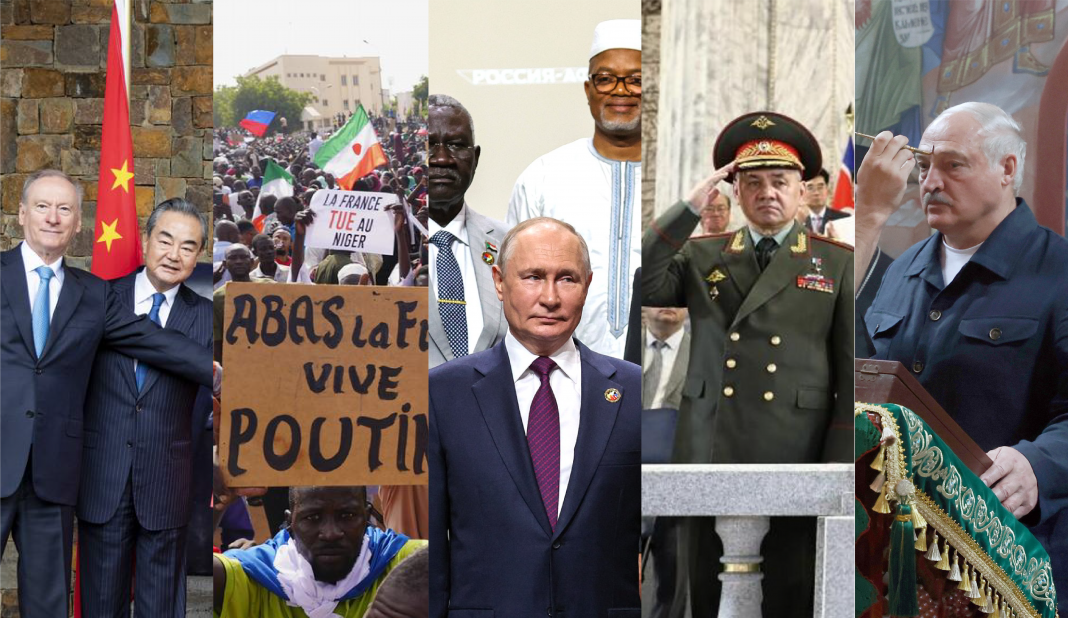This report describes the key events that significantly impacted Russia’s political, economic and social processes.
Based on the results of the past week, the following trends can be summarised:
- Recently, processes have been significantly intensifying around the final formation of the Union State of Russia and Belarus. Lukashenko’s next visit to Moscow demonstrated that the Belarusian president is increasingly trying on the role of a politician at the all-Russian level. According to Ascolta, such processes may indicate that in the conditions of the Union State, it is Lukashenko who will claim the role of president – that is, a public leader. At the same time, Putin will assume the position of head of the State Council, concentrating all the levers of power in his hands while remaining behind the scenes of public politics.
- Putin is increasingly demonstrating his readiness for a negotiation process with the West. In fact, the Kremlin’s position proceeds from the fact that hostilities in Ukraine began precisely because the West disagreed with Russia’s terms. And if the situation has not changed after almost two years, then escalation is inevitable. Apparently, the West will respond shortly, either agreeing with Moscow or considering such ultimatums a bluff and continuing to hold its positions.
- One of the main topics of the past week in Russia was the Russia-Africa summit. In fact, the Kremlin is still trying to demonstrate that the break in economic relations with Europe has opened up new opportunities for Moscow. Russia’s complete turn towards the Global South is demonstrated in the public. At the same time, the African continent is fraught with many threats Russia is already facing. First, Moscow’s relations with African states are noticeably exaggerated. Only 17 African leaders agreed to attend the last summit. Other countries were represented at the level of prime ministers or even diplomatic missions. Some states even refused to participate. Secondly, the confrontation between Moscow and Beijing is noticeably intensifying, which does not plan to share its zone of influence (that is, Africa) even with its closest partners.
This digest examines the following issues that were most relevant for Russia during the period from 24 to 30 July:
1. Continuation of Alexander Lukashenko’s visit to Russia;
2. Plenary session of the Russia-Africa Economic and Humanitarian Forum;
3. 2023 Russia–Africa Summit;
4. Vladimir Putin’s meeting with the heads of African delegations on Ukrainian issues;
5. Press conference of Putin on the results of 2023 Russia–Africa Summit;
6. Visit of Sergei Shoigu to the DPRK;
7. Condemnation of the military coup in Niger by the Russian Foreign Ministry;
8. Nikolai Patrushev’s visit to South Africa;
9. Report of the Ministry of Foreign Affairs of the Russian Federation on the situation with the Ukrainian Orthodox Church.
This Content Is Only For Subscribers
- Continuation of Alexander Lukashenko’s visit to Russia
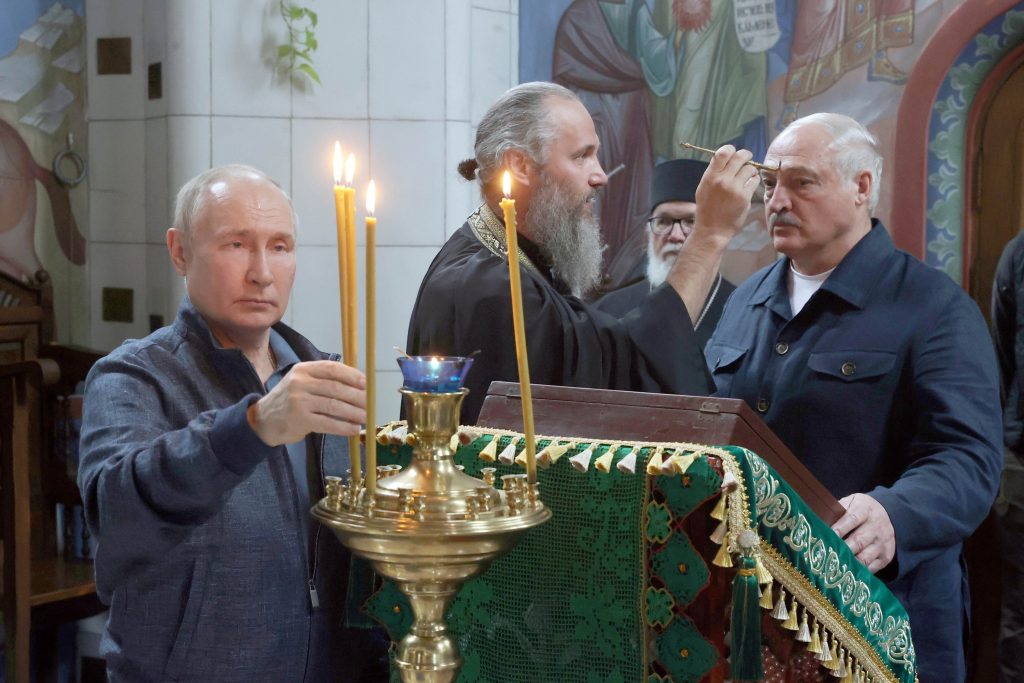
On Sunday, July 23, the next visit of the President of Belarus to Russia began (about him, Ascolta wrote in detail in the previous digest). On the same day, the Russian and Belarusian leaders visited the Museum of Naval Glory in Kronstadt and the St. Nicholas Naval Cathedral, after which they talked to those gathered on the square near the temple. During the public part of the meeting with Putin, Alexander Lukashenko said that he plans to stay in Russia for another day to discuss all the necessary issues. Notably, on Monday, Putin and Lukashenko continued the public part of the visit by visiting Valaam. In general, many observers noted that the heads of state focused on visiting temples and monasteries, which, apparently, had a specific connotation. There were no joint statements following Lukashenko’s two-day visit.
Timeline:
- On Monday, July 24, Vladimir Putin and Alexander Lukashenko visited the Spaso -Preobrazhensky Valaam stauropegial monastery.
- The leaders of Russia and Belarus visited the main temple of the monastery – the Transfiguration Cathedral, where the relics of the founders of the monastery – St. Sergius and Herman, are kept.
- Putin and Lukashenko visited the Smolensk Skete, the last one on Valaam, where they attended a service in the Church of the Smolensk Icon of the Mother of God and toured the chapel.
- Finally, the heads of state visited the Vladimir skete, where they examined the temple in the name of the Holy Equal-to-the-Apostles Prince Vladimir.
Outcomes and outlook:
To the extent of his integration into the all-Russian agenda and political life, Alexander Lukashenko will obviously visit Russia more often on working visits. His trip to St. Petersburg is the first meeting with the President of the Russian Federation after the relocation of PMC Wagner to Belarus and the official announcement of the deployment of Russian nuclear weapons in Belarus. In addition, the visit to Russia took place a few days before the opening of the Russia-Africa summit.
It is known that the level of relations between Belarus and some African countries (for example, Zimbabwe) is much higher than that of Russia. In addition, Belarus has its own approaches to the leadership of the People’s Republic of China, which today controls the African continent’s leading political and economic processes. Thus, Putin and Lukashenko had something to discuss.
A minimum of information on the results of the meeting of the two presidents and, at the same time, the maximum external entourage (a meeting without ties, Putin personally driving a car, putting Lukashenko in the passenger seat, a trip to Kronstadt, etc.) suggests that a range of fundamental issues, but of a strategic nature, was discussed. We will most likely learn about the essence of the negotiations shortly – perhaps, by indirect signs.
In our special article, discover more about the current aspects of Russian-Belarusian relations and the events in Belarus over the past two months.
- Plenary session of the Russia-Africa Economic and Humanitarian Forum
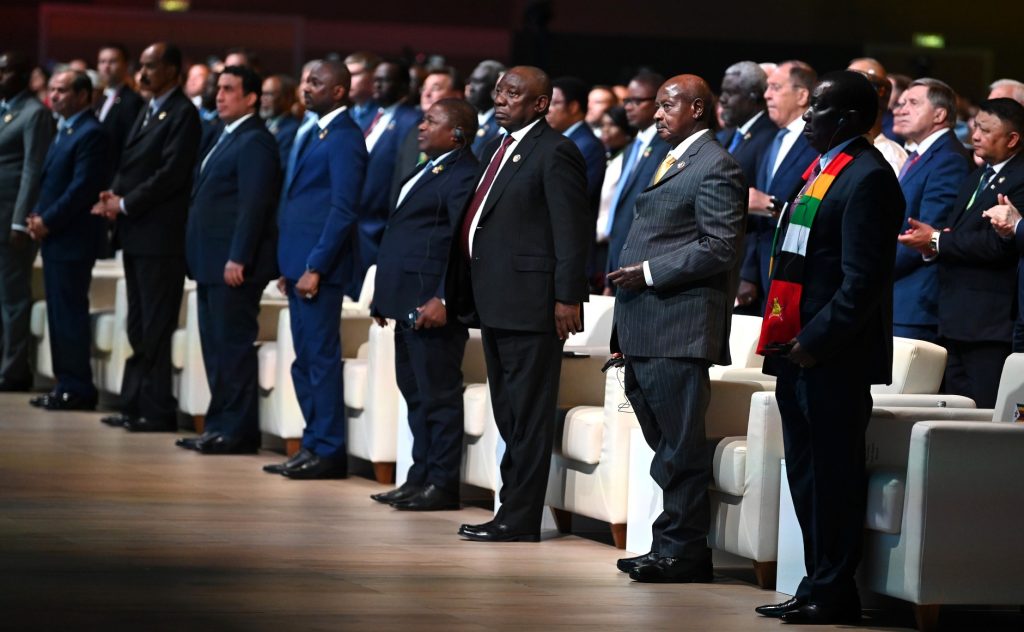
On Thursday, July 27, the Russia-Africa Summit kicked off in St. Petersburg, on the first day of which Vladimir Putin held several bilateral meetings with leaders and representatives of African states and also took part in the Plenary Session of the Second Russia-Africa Economic and Humanitarian Forum. The forum’s central theme was “Technology and Security in the Name of sovereign development for the Benefit of Man.” The meeting was also attended by the Chairman of the African Union, the President of the Union of Comoros, Azali Assoumani, Patriarch Kirill, the Chairman of the Board of Directors of the African Export-Import Bank, Benedict Orama and the President of the New Development Bank, Dilma Rousseff. The meeting was moderated by Irina Abramova, Director of the Institute for African Studies of the Russian Academy of Sciences.
Key theses:
- Vladimir Putin: “The potential of Africa is evident to everyone. Thus, the average annual growth rate of the continent’s GDP over the past 20 years – 4-4.5 per cent per year, exceeding the global one. The population is approaching 1.5 billion and growing faster than anywhere else in the world. It is also characteristic that the growth of the middle class, which forms the primary demand for modern goods and services, outstrips similar indicators in most regions of the world.”
- Vladimir Putin: “I would like to note that last year Russian-African trade reached $18 billion. This is one of the obvious results of the Sochi Russia-Africa summit. I am sure that together we are capable of increasing trade more radically in the foreseeable future. And, by the way, in the first half of this year alone, the volume of export-import operations with African countries has grown by more than a third. The trade structure also looks good: over 50 per cent of Russian deliveries to Africa are machinery and equipment, chemical products, and food.”
- Vladimir Putin: “We understand the importance of an uninterrupted food supply to African countries – this is important for socio-economic development and maintaining political stability. Therefore, we always pay and will continue to pay special attention to the supply of wheat, barley, corn and other grain crops to African friends, including as humanitarian aid through the UN Food Program.”
- Putin: “A paradoxical picture is emerging: on the one hand, the Western countries are obstructing the supply of our grain and fertilisers, and on the other hand, I will say frankly, they are hypocritically accusing us of the current crisis situation in the global food market. This approach was especially evident in the implementation of the so-called grain deal, concluded with the participation of the UN Secretariat and initially aimed at ensuring global food security, reducing the threat of hunger and helping the poorest countries, including in Africa.”
- Putin: “To be specific, I’ll add, I’ll say: in the coming months, in the next three to four months, we will provide Burkina Faso, Zimbabwe, Mali, Somalia, the Central African Republic, Eritrea with 25,000-50,000 tons of grain free of charge, we will offer and free delivery of these products to consumers.”
- Putin: “Russia’s share in the world wheat market is 20 per cent, Ukraine’s is less than five per cent. This means that Russia significantly contributes to global food security and is a solid, responsible international supplier of agricultural products.”
- Vladimir Putin: “We are also interested in the further development of cooperation with African countries in the energy sector. This cooperation is based on rich experience: over many years, Soviet and Russian specialists have designed and built large energy centres in Angola, Egypt, Ethiopia and other countries of the continent with a total capacity of 4.6 gigawatts, a total of – I want to emphasise this and draw your attention to this, dear friends, is a quarter of Africa’s hydropower capacity.”
- Putin: “New instruments of concessional lending for the purchase of our industrial products by Africans, their transportation to the continent and after-sales service are being developed.”
- Putin: “Being one of the leaders in information and communication technologies, Russia is expanding cooperation with African countries in information security, artificial intelligence, and the digital economy.”
- Putin: “Russia is also actively reorienting transport and logistics flows towards the countries of the global south, including, of course, Africa. The North-South International Transport Corridor, which we are developing, aims to provide Russian goods with access to the Persian Gulf and the Indian Ocean, from where they can reach the African continent by the shortest sea route.”
- Vladimir Putin: “Today, almost 35,000 students from Africa study at Russian universities, which is growing yearly. The quota for education for Africans at the expense of the federal budget has increased two and a half times over three years and will amount to more than 4,700 people for the next academic year.”
- Putin: “The Russian side is set to develop cooperation with African countries, with the African continent in the field of mass communications, including in the areas of content exchange, organising educational courses for workers and students of the media, and conducting experimental events.”
- Azali Assoumani (President of Comoros and Head of the African Union): “The multipolar world of the 21st century cannot close on itself. That is why Africa wants to establish a fair and mutually beneficial partnership with the world. Economically, Africa in particular, with 3.8 billion people by the end of the century, wants to work closely with more partners, both bilaterally and multilaterally.”
- Assumani: “80 per cent of our GDP comes from the primary agricultural sector. This is a sector where partnerships and our new projects can develop. Our countries’ private and public sectors will participate equally in a mutually beneficial partnership.”
- Assoumani: “The suspension of the grain deal may have some impact on our cooperation. Russia is closely cooperating with us and is doing a lot [to solve] problems with grain, the food problem. More than 1.9 million tons were delivered from Russia, and the number of deliveries exceeded three billion dollars.”
- Assoumani: “The Ukrainian crisis has a serious impact on the situation, so the resolution of this crisis will save a large number of lives of people who depend on food supplies. Our continent is currently experiencing a serious [growth] in food prices, so we appeal to all participants in the process with a big request: to facilitate the delivery of both Ukrainian and Russian grain to our countries.”
- Assoumani: “Today it is necessary to fight for a sustainable peace between Russia and Ukraine, and this is exactly the message that the African Union and I personally are advocating today. With this thought, we went to see President Zelensky in Kyiv. We are addressing the President of Russia, Mr. Putin. We are confident that our call for peace will be heard, as this is what humanity needs today. On behalf of the African Union, I once again call for peaceful coexistence between Russia and Ukraine, fraternal peoples, and neighbouring peoples. And I am grateful that you will hear our message, our appeal.”
- Patriarch Kirill: “Despite the geographical remoteness, the peoples of our countries have good relations. The secret of such friendship is quite simple: Russia has never considered the African continent a space for profit or an object for colonisation and has never spoken to the peoples of Africa in an arrogant tone, from a position of superiority and strength.
- Patriarch Kirill: “Over the past decades, the world has changed beyond recognition. I am talking now not so much about the political map, economic processes or technical progress but about the dangerous spiritual and moral climate that is being actively and even aggressively shaped by the efforts of many Western countries.”
- Patriarch Kirill: “I know that, despite the enormous pressure, the vast majority of African countries categorically reject the legalisation at the legislative level of the so-called same-sex unions, euthanasia and other sinful phenomena from a religious point of view.”
- Patriarch Kirill: “Cultural and national diversity is the wealth of any country, which must be carefully preserved. I believe Russia is ready to share its centuries-old experience in this area.”
- Patriarch Kirill: “Unfortunately, in 2019, the primate of the Alexandrian Orthodox Church, Patriarch Theodore, of course, under external pressure, decided to recognise the schismatic church group in Ukraine. I repeat once again, these sad circumstances prompted the Russian Orthodox Church to create the Patriarchal Exarchate of Africa in December 2021.”
- Dilma Rousseff (President of the New Development Bank): “We know that protectionist policies, which are always carried out on the one hand, affect developing countries much more. The use of sanctions for political purposes and attempts to expand one country’s jurisdiction outside its territory does not solve a single problem, but, on the contrary, only worsens existing problems, as it becomes noticeable.”
- Rousseff: “We would like to create different sources of income so that developing countries can achieve stability. At the moment, we know that the use of the national currency is about 20 per cent of all banking transactions. About one-third of all banking transactions in China are conducted in the national currency.”
- Rousseff: “I am sure that the BRICS New Development Bank and all participating countries will become increasingly important players in the international arena in the future, and the bank will become a new platform. In this context, this summit meets the challenges of the times and is in line with the issues facing our bank, contributing to achieving a multilateral peace for the benefit of developing countries.”
- Benedict Orama (Chairman of the Board of Directors of the African Export-Import Bank): “Our trade turnover is now $20 billion. All this is happening despite the coronavirus pandemic and the difficulties we face in the international arena.”
- Orama: “Thanks to the strong partnership between Afreximbank and the Russian Export Center, we have set the goal of doubling our trade turnover over the next four years, and we believe this goal is quite achievable. The challenges associated with ensuring global food security have highlighted the key role of Russia in ensuring food security in Africa. To a large extent, African economies depend on the supply of Russian fertilisers, and a large amount of the fertiliser we import comes from Russia.”
- Orama: “Every day, 300 million Africans suffer from hunger, and it is very important that we do our best to ensure full sovereignty. We must ensure full food security – this is one of our priorities.”
Outcomes and outlook:
Russia is trying to expand its presence in the so-called “Global South” markets, including Africa. Potentially (in the next ten years), Africa will become the most interesting region for developing business activity and investment. However, Africa can become the stumbling block that will cause contradictions in relations between Moscow and Beijing.
The fact is that Africa is a territory that China considers its sphere of influence. China has invested at least $1 trillion in Africa in recent years. The arrival of Russia on the continent is viewed rather jealously by Chinese leaders. This explains several points: the lowering of the status of participation in the forum in St. Petersburg by many African states, the rather bold refusal of the President of Zimbabwe, E. Mnangagwa, from Russian offers of gratuitous grain, and the refusal of the visit of the President of Equatorial Guinea Teodoro Obiang to Belarus. Therefore, the current forum can be called preliminary: practically all agreements reached must be approved in Beijing. Otherwise, good intentions and wishes will remain.
- 2023 Russia–Africa Summit
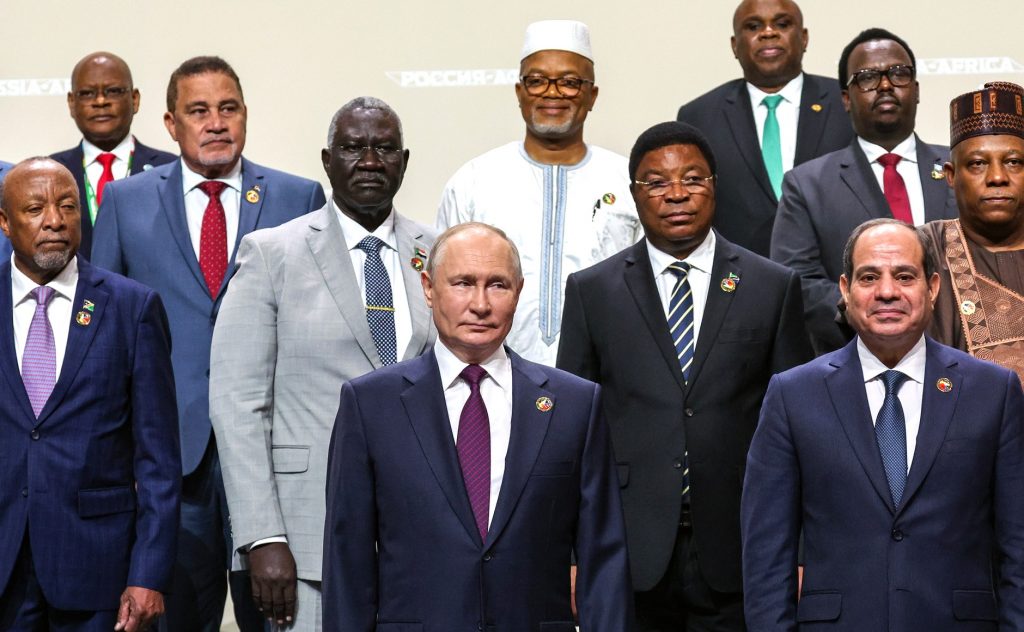
On Friday, July 28, the plenary session of the second Russia-Africa summit was held at the Konstantinovsky Palace in St. Petersburg. This event was the key event of the two-day summit. It was preceded by a plenary session of the Russia-Africa Economic and Humanitarian Forum and several bilateral meetings between Vladimir Putin and leaders and representatives of African states. Also, before the start of the meeting, a joint photograph was taken with the heads of delegations – participants of the summit.
List of bilateral meetings of Vladimir Putin with leaders and representatives of African states (July 27-28):
- Negotiations with the Prime Minister of the Federal Democratic Republic of Ethiopia, Abiy Ahmed;
- Meeting with Dilma Rousseff, the President of the New Development Bank, established by the BRICS countries;
- Meeting with the President of the Arab Republic of Egypt, Abdelfattah Sisi;
- Trilateral meeting with the Chairman of the African Union, President of the Union of the Comoros Azali Assoumani and Chairperson of the African Union Commission Moussa Fakie Mahamat;
- Meeting with President of the Republic of Mozambique Filipe Jacinto Newsy;
- Meeting with President of the Republic of Burundi Evariste Ndayishimiye;
- Working breakfast with leaders of African regional organisations;
- Meeting with President of the Republic of Zimbabwe Emmerson Dambuzo Mnangagvoy;
- Meeting with the President of the Republic of Uganda, Yoweri Kaguta Museveni;
- Meeting with President of the State of Eritrea Isaias Afworki;
- Meeting with President of the Central African Republic Fausten Arkanzhem Touaderoi;
- Negotiations with the Chairman of the Presidential Council of the State of Libya, Mohammed Menfi;
- Meeting with the President of Cameroon, Paul Biya;
- Meeting with President of Senegal Macky Sall;
- Meeting with President of South Africa Cyril Ramaphosa;
- Meeting with President of the Transitional Republic of Burkina Faso Ibrahim Traore;
- Meeting with the President of the Republic of Guinea-Bissau Umaru Sissoku Embalo;
- Meeting with Transitional President of Mali Assimi Goytoy;
- Meeting with President of the Republic of the Congo Denis Sassou Nguesso.
Key statements during the summit:
- Putin: “Unfortunately, some manifestations of colonialism have not been eliminated to this day and are still practised by the former metropolises, particularly in the economic, information and humanitarian spheres.”
- Putin: “Russia and the states of Africa stand together for building a new, more just architecture of the world order, jointly defending international law, the UN Charter, the central role of this world organisation, and trying to coordinate approaches on key issues on the international agenda. It is characteristic that our positions are very close or completely coincide on many of them. This is evidenced by the main provisions of the political declaration, which is prepared for approval by the summit.”
- Vladimir Putin: “I would also like to note that before our very eyes, the African continent is becoming a new centre of power. Its political and economic role is growing exponentially. And everyone will have to reckon with this objective reality.”
- Putin: “We are interested in the closest cooperation between law enforcement structures and special services of the Russian Federation and African countries.”
- Assoumani (President of Comoros and Head of the African Union): “The African Union is engaging in economic transformation. Russia, of course, will participate in the investment and will also benefit from our many resources.”
- Assoumani: “I want to emphasise that our partnership has a great future, especially if we actively involve young people, women. This is the future of our countries, and we must instil in them the values of entrepreneurship.”
- Ibrahim Traore (to the President of the Transitional Period of Burkina Faso): “Russia is also a family for Africa because we have the same history. Russia suffered many losses to liberate Europe and the world from Nazism during the Second World War. We have the same history in the sense that we can be said to be the world’s forgotten people. This applies to both films and books: in many ways, Africa and Russia, their role in the fight against Nazism has been forgotten.”
- Traore: “I don’t understand how it happens that Africa, which has so many resources, water, sun, how does it happen that today it is the poorest continent, where there is the most hunger, and how is it that we are forced to ask for help?”.
- Paul Biya (President of the Republic of Cameroon): “There are more than a billion people in Africa, but we are underrepresented in international organisations. In particular, we are talking about the United Nations. We hope for Russia’s support in correcting the current unfair situation.”
- Biya: “To solve security problems and fight terrorism, we must also cooperate. Russia really assists many countries of the world in the fight against terrorism. And Africa today is facing this problem and a range of other problems. We hope that together we will move towards finding solutions.”
- Faustin-Archange Touadera (President of the Central African Republic): “Despite the difficulties of geopolitical, climatic, energy nature, our country, the Central African Republic, uses the help of Russia. Our friendships are at the highest level.”
- Touadéra: “Our country, its subsoil, its nature is a huge wealth, but the use of these resources is currently not enough. The heavy colonial yoke continues to remind of itself. We, the Central African Republic, invite all peoples, all world countries, to mutually beneficial, effective cooperation within the international order based on the UN Charter.”
- Yoweri Museveni (President of the Republic of Uganda): “I have a great opportunity to take part in various events over the past 60 years. In order to understand the difficulties we face, we must remember that by 1900 Africa was completely colonised except for Ethiopia.”
- Museveni: “Germany is a country that does not produce or grow coffee, but earns more per year from coffee than all African countries – 6.8 billion dollars.”
- Museveni: “I invite our allies – Russia, India, China and other countries – to make a decision that can help us – to buy finished products from Africa, and not raw materials, for example, processed coffee – not grain, but ready-made; chocolate instead of cocoa beans; textiles instead of cotton; steel instead of iron ore – we have the word “after” which means “iron ore”; electric batteries instead of lithium and so on.”
- Denis Sassou-Nguesso (President of the Congo): “Implementing our plans is possible only if we combine efforts within the framework of continental, regional or sub-regional organisations. Russia’s assistance to Africa lies in a strategic partnership, and we call for establishing a strategic mutually beneficial partnership.”
- Sassou Nguesso: “Speaking of peace in Africa, we must say again: we are striving for peace and hope peace will also be established in Europe. Therefore, I once again call for ending the Russian-Ukrainian conflict.”
- Abdelfattah Sisi (President of Egypt): “The documents that we adopt today at the summit are significant for defining our strategic partnership, not to mention the broad prospects that open up in connection with the development of our cooperation, which is in our mutual interests.”
- Sisi: “Taking this opportunity, I assure you that Egypt is ready to continue to strengthen and deepen our strategic cooperation on the principles that we agree on. We are also ready to intensify ties and relations between our and Russian organisations and companies.”
- Isaias Afwerki (President of the Republic of Eritrea): “I am confident that the Russian Federation has all the necessary industrial and production base to support such a strategic partnership between Russia and Africa, but also to other continents that would like to participate in the implementation of our goals “.
- Afworki: “In 25 years, we will have a population of 2.5 billion people. We will need to solve problems; it is better to solve them sooner rather than later. We need to think ahead.”
- Umar Sissoku Embalo (President of the Republic of Guinea-Bissau): “We have identified as priorities the following goals of cooperation with Russia in three main areas important for the development of Guinea-Bissau, namely: education, youth and sports; extraction of minerals, primarily energy resources; fisheries sector infrastructure”.
- Embalo: “Naturally, the Government of Guinea-Bissau will cooperate with the Government of Russia both on a bilateral basis and in a multilateral format following the action plan adopted by the Russia-Africa Cooperation Forum. I can also say that we will use the full potential of our relationship.”
- Muhammad Menfi (Chairman of the Libyan Presidential Council): “In the current historical conditions, we, of course, would like to remind you that the Russian Federation is a permanent member of the UN Security Council and plays an important role in the implementation of the plans of the African continent, which is striving for fair, effective, sustainable development”.
- Menfi: “It must be said that several African leaders have concluded agreements with the Russian Federation that benefit us to contribute in every possible way to solving the food problem.”
- Assimi Goita (President of the Transitional Period of the Republic of Mali): “Despite the geopolitical situation, the global situation, it is obvious that the Malian people are mobilised, and our goal is to consolidate the strategic partnership between Mali and the Russian Federation for the benefit and for the sake of the happiness of our peoples.”
- Goita: “We share the principles of justice, adherence to traditional values that unite us with Russia. Today, more than ever, the destinies of the African people and the Russian people are linked. We must face common challenges together. The assertion of the full sovereignty of our countries, the fight against terrorism, the fight against poverty, the promotion of rights and freedoms – all this struggle must be carried out effectively.”
- Goita: “We stand for a new architecture of international relations. Of course, this will require reform of the UN Security Council. Our community must do everything to ensure that a fair reform occurs.”
- Macky Sall (President of the Republic of Senegal): “The potential of our partnership is huge. Africa is 30 million square kilometres, with more than one billion 300 million inhabitants. Russia is also a huge country. We together – our continent and your country – are a huge association, a union. We have huge natural resources, huge demographic potential. Therefore we can work and cooperate in different areas: agriculture, industry, hydrocarbons, information technology, security, transport, digital economy, and so on.”
- Sall: “I want to answer our young brother, colleague, the President of Burkina Faso: we did not come here to beg for something. We do not come to other places for this: we work to create a worthy partnership for the development and well-being of our peoples, wherever discussions take place – in Dakar, Washington or St. Petersburg. We are fighting for dignity, which goes beyond the boundaries of different generations – many Presidents have spoken about this, as well as Mr President [Republic of the Congo Denis] Sassou Nguesso.”
- Cyril Ramaphosa (President of the Republic of South Africa): “South Africa and Africa are very encouraged by the Russian Federation’s commitment to practically strengthening our cooperation. This is especially important as we chart a new course for economic development, growth and prosperity and try to achieve the Sustainable Development Goals.”
- Ramaphoza: “We in South Africa firmly believe that negotiation and dialogue, as well as adherence to the UN Charter, are necessary for the peaceful and just resolution of conflicts. We hope constructive interaction and negotiations can end the current conflict between the Russian Federation and Ukraine.”
- Emmerson Mnangagwa (President of the Republic of Zimbabwe): “We have this philosophy in Zimbabwe: the country is being built, developed, ruled by its own people. We leave no one behind in our development. Multilateralism, strengthening existing institutions, and creating new partnerships are key to a new world order that is just and peaceful. This world order is already being formed.”
- Mnangagwa: “I would like to express my sincere gratitude to the Russian Federation for giving Zimbabwean companies space at the show so that we can showcase the potential in our economy and our environment.”
Statements by Vladimir Putin and the Chairman of the African Union following the Russia-Africa Summit:
- Putin: “Representatives of African states have shown political will, demonstrated their independence and real interest in developing cooperation with our country.”
- Putin: “In this context, it is very indicative that a solid package of joint documents was adopted due to the work. First, I would like to note the St. Petersburg declaration approved by the leaders. It sets out the strategic directions for developing cooperation between Russia and African countries for the long term.”
- Putin: “During the period between the Russia-Africa summits, a dialogue partnership mechanism will operate. Regular political consultations will continue between the Ministries of Foreign Affairs of Russia, African countries and the leadership of the African Union.”
- Putin: “Our country will continue to supply crops to African friends both on a contract basis and free of charge, to assist in developing the energy sector to meet the growing needs of the economies of African states for hydrocarbon fuel and power generation capacities. And I mean not only traditional sources of energy but also innovative ones, implemented through our Rosatom.”
- Assoumani: “We know that friends are known in trouble. And just when Africa was in a difficult situation, it was a period of slavery, a period of colonisation or a period of apartheid, Russia always helped us. It was one of the first countries that helped us fight against colonisation, apartheid and slavery.”
- Assoumani: “Practically all African countries sent their students to study in Russia, and all these personnel now work for us both in the private sector and public administrations.”
- Assoumani: “We live in one world and stand for Africa to be part of those organisations that make decisions. We live in a multipolar world. Russia will invest in Africa, but this does not mean that others will not come to us. We will create conditions for positive competition. We will not have a single partner but numerous partners. I think that if we have two or three partners, it’s even better; they will attract other partners.”
Documents adopted and signed following the results of the Second Russia-Africa Summit:
1. Declaration of the Second Russia-Africa Summit.
2. Declaration of the Second Russia-Africa Summit on the Prevention of an Arms Race in Outer Space.
3. Declaration of the Second Russia-Africa Summit on cooperation in ensuring international information security.
4. Declaration of the Second Russia-Africa Summit on strengthening cooperation in the fight against terrorism.
5. Action Plan of the Russia-Africa Partnership Forum for 2023-2026
6. Memorandum of Understanding between the Government of the Russian Federation and the Intergovernmental Organization for Development (IGAD) on the basics of relations and cooperation.
7. Memorandum of Understanding between the Government of the Russian Federation and the Economic Community of Central African States (ECCA) on the basics of relations and cooperation.
Outcomes and outlook:
All the rhetoric of Putin and Russian representatives at the Russia-Africa summit aimed to prove the advantages of Russian resources and economic opportunities over Western ones. The central thesis is “we are not colonialists”, an appeal to justice, a willingness to dump in exchange for friendship and a stable geopolitical orientation.
However, the summit showed that African countries are interested not so much in Russian grain as in Russian weapons, and Russia is interested in access to the resource wealth of the African continent. The summit itself was held with minimal efficiency. But in informational and ideological terms, he concluded that it is possible to revive the old Soviet tradition of active influence on the countries of the “third world” and leadership in this process.
Also, dialogue with African countries is important for Russia in terms of finding potential allies in the United Nations since most African states have recently voted for anti-Russian resolutions. It is evident that Russia is in a hurry to occupy its niche in the new global distribution of labour and markets, which will inevitably follow a further split of the world into two systems and a new round of the global economic crisis.
- Vladimir Putin’s meeting with heads of African delegations on Ukrainian issues
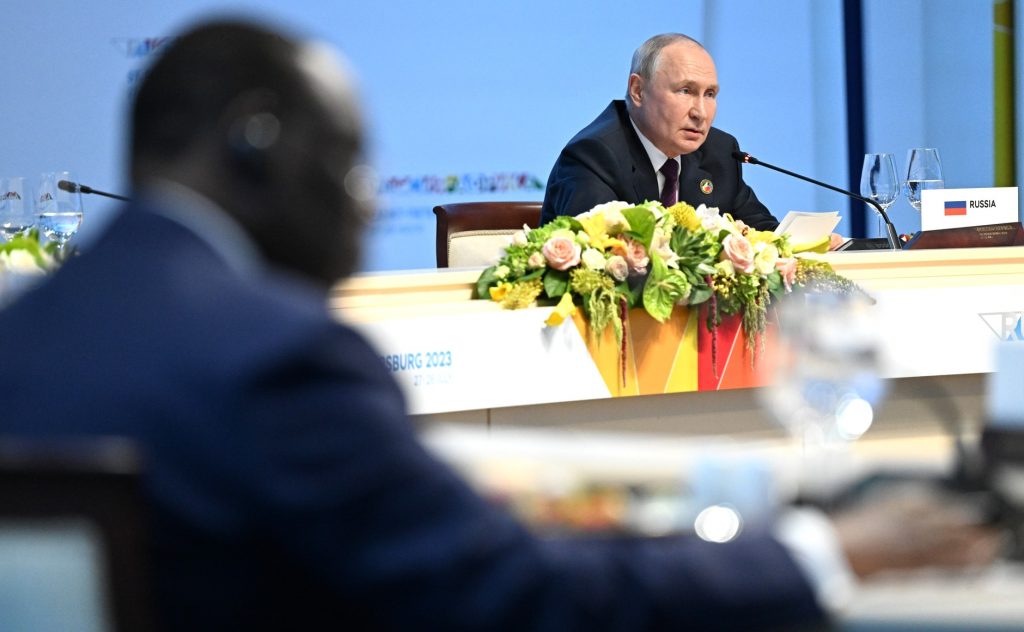
On Friday, July 28, Vladimir Putin held a meeting in the format of a working lunch with the heads of delegations of African states on Ukrainian issues. The meeting was attended by the Chairman of the African Union, the President of the Union of Comoros, Azali Assoumani; President of Egypt, Abdelfattah Sisi; President of the Republic of the Congo, Denis Sassou Nguesso; President of Senegal, Macky Sall; President of Uganda Yoweri Kaguta Museveni, President of South Africa Cyril Ramaphosa, Minister of Foreign Affairs and International Cooperation of the Republic of Zambia Stanley Kakubo.
Key theses:
- Putin: “I hope that you, dear colleagues, understand well the nature and origins of this crisis – in any case, we tried to convey our vision of this problem. We believe that the problem did not arise yesterday; it was provoked by some forces in the West, who have been preparing for a hybrid war with our country for many years. It did everything to turn Ukraine into a tool to undermine the foundations of the security of the Russian Federation, to damage Russian positions in the world, yes and to undermine our statehood. I say this with good reason.”
- Putin: “Of course, we are impressed by the position of the countries that put forward the initiative that the principles of the UN Charter must be respected and put into practice in their entirety and interconnection. Indeed, there should be no double standards, unilateral sanctions, attempts to ensure one’s security at the expense of others.”
- Putin: “We are being told today that we are violating the Charter of the United Nations. I do not think so. On the contrary, I am sure that we acted per the UN Charter. After the coup in 2014, the Ukrainian authorities began hostilities, in fact, against part of their people, using aircraft, heavy equipment, and tanks against those who did not agree with the coup d’état supported by the West in 2014.”
- Putin: “Of course, I won’t talk about the details of what we agreed on now; it probably won’t be correct. But let me remind you – not everyone knows this, but we know it well – that Kyiv received its independence and sovereignty during the collapse of the Soviet Union based on the Declaration of Independence. This declaration was written in black and white that Ukraine is a neutral state. For us, it is of fundamental importance.”
- Assoumani: “You have already listened to the speeches of various leaders at the plenary session of the Russia-Africa summit, and as you can conclude from these speeches, all of Africa would like to see the establishment of peace; we are all in support of peace. In many ways, our coming here is also evidence of this.”
- Assoumani: “Based on your explanation, we understand the origins of this conflict; we understand how and where it began. At the same time, we were very pleased to hear that you are celebrating the African peace initiative launched by our seven countries.”
- Assoumani: “You are absolutely right when you say that we have taken different positions on this conflict, but the key element of the position that we have all taken is that this conflict should be resolved through negotiations, dialogue, and you agree that this is the best way forward.”
- Assoumani: “We proposed to implement the Black Sea Grain Initiative, we talked about the need to open the Black Sea, and we said that we would like the Black Sea to be open to world markets. And we did not come here to ask for some “gifts” for the African continent. Of course, we understand that out of generosity, you have decided to donate grain to some African countries facing certain difficulties. We treat this with great respect and celebrate it. However, this is not our main goal here; it is not our main task to achieve some supplies of this nature.”
Outcomes and outlook:
In fact, the meeting was a continuation of the mission of African leaders to Kyiv and Moscow in June this year. Putin has clarified that he is not opposed to negotiations with Ukraine but has shifted the responsibility for the lack of these negotiations to Ukraine. In general, this thesis largely demonstrates Russia’s foreign policy and its attempts to change public opinion by introducing the thesis that the real aggressor is allegedly Ukraine, which does not want negotiations.
Most of the proposals made by African leaders, in one way or another, develop the earlier proposals of China, the “Xi Jinping formula”, which, as you know, Ukraine does not accept since it is promoting its own “Zelensky formula”. The meeting is necessary regarding a series of events aimed at creating a single platform of the “Global South”, which will be offered to the United States and Western countries regarding the settlement of the military conflict between Russia and Ukraine.
- Press conference of Putin on the results of 2023 Russia–Africa Summit
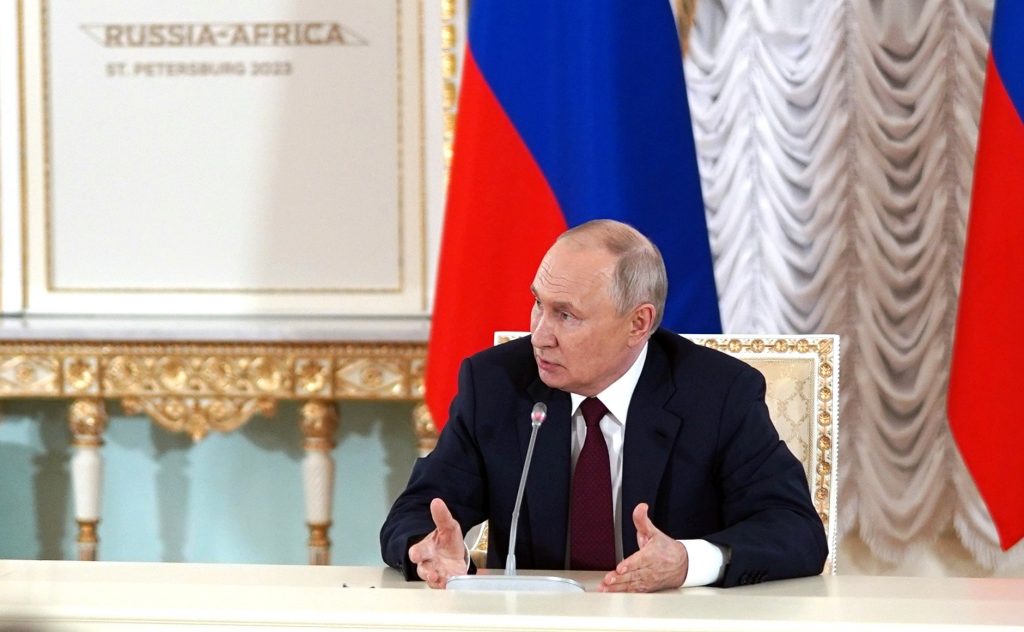
On Saturday, July 29, Vladimir Putin held a meeting with journalists, where he answered several questions regarding the results of the Russia-Africa summit, the situation in Ukraine, and several domestic political topics. Communication with media representatives lasted more than an hour.
Putin’s key theses:
- “The lead voice is very good, but the lead voice and the Kalashnikov assault rifle were much more effective then. Therefore, everyone remembers our concrete assistance to African countries in the struggle for their liberation.”
- “Everyone is well aware that the African continent is a storehouse of mineral resources, and it is. Some countries in Asia are actually transferring their reserves to the mineral resources of Africa.”
- “I can’t say that the whole future belongs to Africa, no – the world is diverse, but Africa has great potential.”
- “In Africa, stability in domestic politics is needed to develop the economy; there is cooperation in the field of military-technical cooperation with Russia.”
- “They [African countries] do not forget about this support [of Russia], including in the UN, I don’t remember myself, but they do.”
- “The peace plan for Ukraine and the grain deal are in no way connected.”
- “Provisions of the African Peace Initiative on Ukraine are being implemented, for example, the exchange of prisoners, humanitarian issues.”
- “Several points from the African initiative are difficult to implement, for example, a ceasefire, Ukraine is under attack, it is difficult to contact us for this in this situation.”
- “I don’t consider command and control my business, so I don’t receive reports on the [so-called] ‘special operation’ every hour, but I contact the Ministry of Defense several times a day.”
- “Ukraine suffered heavy losses in terms of manpower and equipment, but there are changes – they take care of equipment: they bring people up and leave. Since June 4, Ukraine has lost 415 tanks, and 2/3 of the equipment lost in battles is Western.”
- “Prices on the world market after Russia’s exit from the grain deal have grown; we will get more and share part of the income with the poorest countries.”
- “When the [so-called] special operation began, it was the impetus for the start of the economic problems of the West, but the root is in their previous mistakes.”
- “[About contacts with Erdogan] We wanted to talk on the phone – President Erdogan offered to talk at a time that was inconvenient for me. I suggested today – he is uncomfortable; I suggested tomorrow, which was also uncomfortable for him. But we agreed to talk, I guess, on Wednesday.”
- “[About the meeting with Erdogan] I don’t know, we agreed that we would see each other: either he would come to us, or I would go to him. Let’s see”.
- “Nobody wants any clashes between Russia and NATO, but if someone wants to, we are ready.”
- “[About the BRICS summit] I don’t think my participation in the summit in South Africa is more important than my presence here.”
- “Our fertilisers are in the Baltic ports, we are ready to give them away for free to countries in need, but they don’t release them; no one can explain why.”
Outcomes and outlook:
In general, Putin’s answers to journalists’ questions were devoted to forming Russia’s new (or somewhat updated) foreign policy position, in which Africa occupies only a tiny part. Recently, with his statements, Putin has been increasingly trying to convey to the general public, primarily in the West, that Russia is ready to return to the negotiating table on the terms that were announced back in January 2022 (during the Russia-NATO and Russia-OSCE meetings).). Hence the non-bloc status of Ukraine and statements about the readiness to fight NATO if necessary.
In fact, the Kremlin’s position proceeds from the fact that hostilities in Ukraine began precisely because the West disagreed with Russia’s terms. And if the situation has not changed after almost two years, then escalation is inevitable. Apparently, in the near future, the West will also respond, either agreeing with Moscow or considering such ultimatums a bluff and continuing to hold its positions.
Once again, Putin’s departure from the ideas of the “Russian world” and “protection of the Russian-speaking population of Donbas” can be noted. As Ascolta wrote earlier, such theses have almost completely disappeared from the public statements of the Russian president. It is possible that in this way, Putin is making it clear to the West that he is ready to make serious concessions (even the return of part of the occupied territories) in exchange for accepting part of Moscow’s conditions.
According to Ascolta, a similar negotiating window of opportunity is open until early 2024. Preliminarily, it is for this period that the final formation of the Union State of Russia and Belarus is planned, during which, among other things, a joint Constitution will be adopted. The new Constitution may remove the previously introduced provisions on recognising Ukraine’s occupied territories as part of Russia.
- Visit of Sergei Shoigu to the DPRK
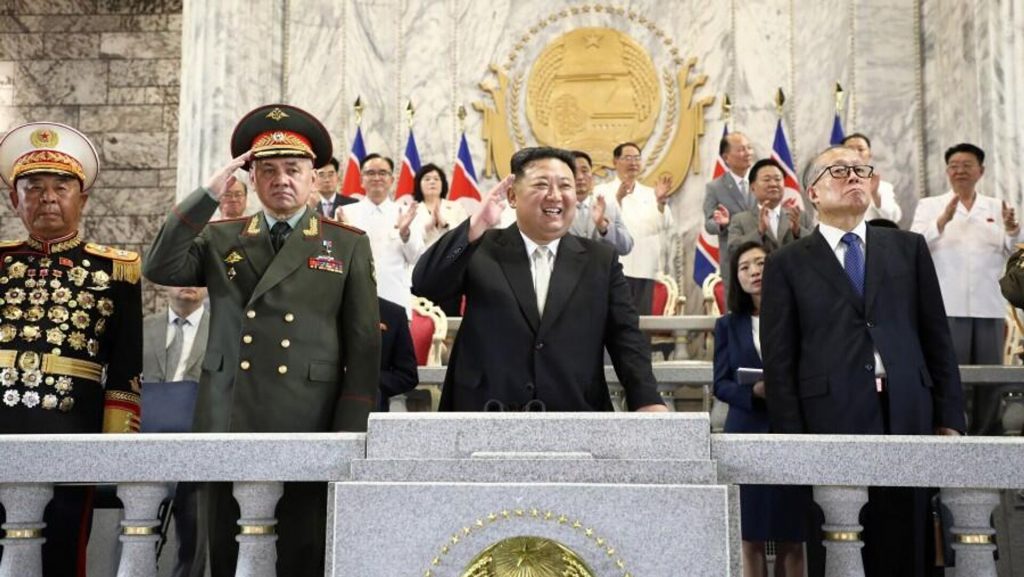
On Tuesday, July 25, a delegation of the Russian Defense Ministry headed by Sergei Shoigu went to Pyongyang on an official visit. The official purpose of the visit was to participate “in ceremonial events dedicated to the 70th anniversary of the victory of the Korean people in the Patriotic Liberation War of 1950-1953.” At the same time, many analysts noted that the real purpose of the visit could be negotiations on the transfer of large stocks of artillery shells to Russia.
Timeline:
- On Thursday, July 27, Sergei Shoigu held talks with Kim Jong-un, during which they discussed defence issues in a “heartfelt atmosphere.” Also, Shoigu gave the leader of the DPRK a letter from Vladimir Putin.
- On the same day, the Russian delegation visited the Weaponry Exhibition-2023, which presented the weapons of the DPRK. Kim Jong-un showed the Russian minister new North Korean drones resembling the American MQ-9 Reaper and RQ-4 Global Haw and the South Korean Global Hawk. North Korean intercontinental ballistic missiles, tanks and armoured vehicles were also demonstrated.
- On Friday, July 28, Sergei Shoigu took part in a solemn meeting dedicated to the 70th anniversary of the Victory of the Korean people in the Patriotic Liberation War in the capital of the DPRK in Pyongyang.
- Also, a military parade was held on Kim Il Sung Square in the centre of Pyongyang, during which T-34 tanks, equipment of 1950-1953, parade crews of all types and branches of the KPA troops and a mechanised column with the latest weapons and military equipment were demonstrated.
Outcomes and outlook:
Shoigu’s visit to North Korea had an outwardly “ritual” character – a trip to celebrations dedicated to the events of 70 years ago, in which the USSR also played an important role. What is striking, however, is that Russia and North Korea have common enemies and goals. Russia and North Korea play an important role in the Pacific region. The military potential of the DPRK is also essential: Pyongyang can give Moscow the shells and missiles that are urgently needed in the current war, while Russia can pay off by delivering helicopters, aircraft, and tanks to the north of the Korean Peninsula.
Notably, the stereotypical perception of North Korea in the West largely contributed to the country’s development under sanctions pressure. At the same time, several sources indicate that Pyongyang has managed to establish its own production of semiconductors (of course, not without the help of China), which are actively used in producing its own weapons. For example, the Hwaseong-2 missiles, the launches of which are being actively discussed by the world community, demonstrate that the DPRK has its own high technologies. Moreover, the development of the three-stage Hwaseong-3 rocket with a flight range of up to 12,000 km is currently being completed. In fact, the pace of development of some types of weapons in Pyongyang is now higher than in China. Without the production of its own chips, such indicators are impossible. They may be supplied for the needs of the Russian military-industrial complex.
It is also striking that, in parallel with the Russian delegation, a high-ranking delegation from China, headed by a member of the Politburo of the CPC Central Committee, Li Hongzhong (informally “man No. 3” in the Chinese political hierarchy), also visited Pyongyang. Pyongyang may have become the site of additional agreements or negotiations between China and the Russian Federation. The very fact of Shoigu’s visit to the DPRK shows that he is not in disgrace, and Putin still trusts him.
- Condemnation of the military coup in Niger by the Russian Foreign Ministry
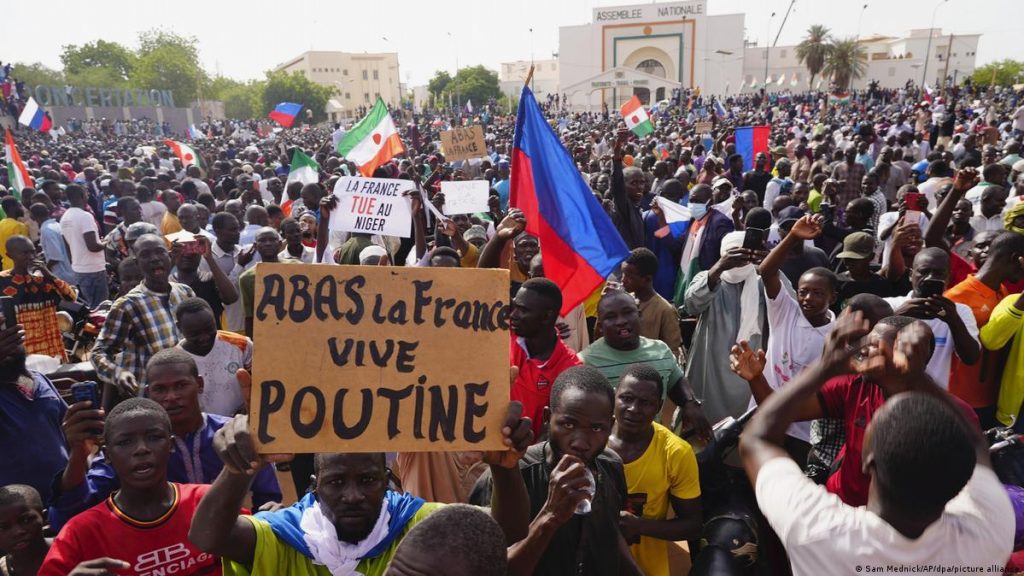
On Wednesday, July 26, a military coup took place in Niger, as a result of which the head of the presidential guard, General Abdurahman Chiani, declared himself the new leader. At the same time, legitimately elected President Mohammed Bazum was arrested. Some media outlets hastened to state that such a military coup was carried out with the support of Russia, which sympathised with both representatives of the military junta and many local residents. Moreover, ousted President Bazum has repeatedly expressed public support for Ukraine and condemned Moscow’s actions.
At the same time, already on July 27, the Russian Foreign Ministry published an official statement regarding the events in Niger, in which it did not support the actions of the military: “We are following with concern the development of the situation in the Republic of Niger, where on July 26 a group of Niger military personnel blocked the presidential palace and announced their removal from power incumbent head of state Mohammed Bazum. We call on the parties to the conflict to refrain from using force and resolve all contentious issues through peaceful and constructive dialogue.”
Later, the Minister of Foreign Affairs of the Russian Federation, Sergey Lavrov, also condemned the military’s actions: “We believe that a coup is an unconstitutional undertaking, and in principle, we always take an apparent position in such cases.”
Outcomes and outlook:
The statement of the Russian Foreign Ministry is instead an attempt to cover up the participation of Russian forces in the coup in Niger. It is clear that Russia cannot directly acknowledge its participation or interest in the coup (which took place on the opening day of the Russia-Africa summit; the President of Niger refused to participate in the summit and was “quite accidentally” overthrown). But the fact that Niger was one of the few states in Africa where France had influence, and now the military men who have come to power defiantly wear portraits of Putin, is significant.
At the same time, it is important to note that the statements of the Russian Foreign Ministry and Sergey Lavrov focus on condemning the coup d’état. It is noteworthy that in the issue of Ukraine, Moscow also regularly appeals to the fact that a coup d’etat was allegedly carried out in Kyiv, which served as the development of further events. At the same time, in recent years, in almost all African states that maintain close relations with Moscow (Mali, Burkina Faso, Guinea), the legitimate government was overthrown by military coups.
- Visit of Nikolai Patrushev to South Africa
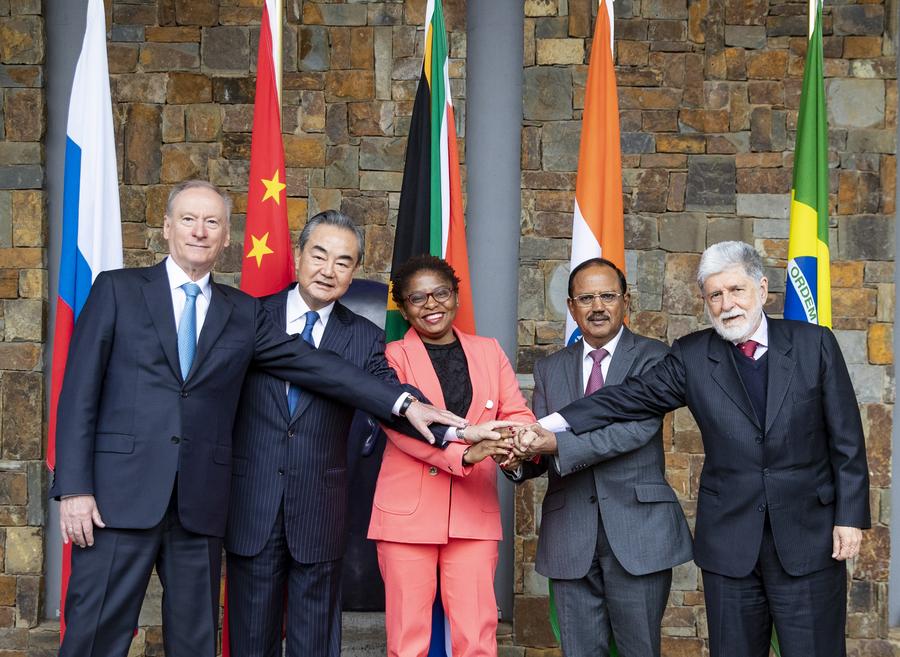
On Monday, July 24, Secretary of the Russian Security Council Nikolai Patrushev arrived in South Africa on an official two-day visit. According to the announced plan of the visit, Patrushev took part in the XIII annual meeting of high representatives in charge of security issues of the BRICS states, as well as in a separate extended meeting in the “Friends of BRICS” format at the level of secretaries of security councils and national security advisers. Later it became known about several bilateral meetings held in Johannesburg.
Timeline:
- On Monday, July 24, Nikolai Patrushev held talks with Politburo member, head of the Chancellery of the Foreign Affairs Commission of the Central Committee of the Communist Party of China Wang Yi on expanding practical cooperation between Russia and China to comprehensively strengthen the security of the two countries. In addition, an exchange of views took place on the situation in the Asia-Pacific region.
- On Tuesday, July 25, Nikolai Patrushev held a working meeting with the National Security Adviser of India’s Prime Minister, Ajit Kumar Doval. Issues of Russian-Indian cooperation in the field of security, as well as cooperation in the field of the economy, were discussed in detail.
- Celso, Special Assistant to the President of the Federative Republic of Brazil for International Affairs Amorim. An exchange of views took place on several problems of international security. The situation around Ukraine was touched upon.
- Nikolai Patrushev held talks with the Secretary of the Supreme National Security Council of the Islamic Republic of Iran, Ali Akbar Ahmadian. During the meeting, issues of continuing a regular dialogue between the security councils of the two countries were discussed, which would make it possible to coordinate Russian-Iranian cooperation on a wide range of issues of international and regional security, as well as on the problems of combating terrorism, countering “colour revolutions” and expanding trade and economic ties.
- Hamad, Secretary General of the UAE Supreme National Security Council Ash -Shamsi. During the meeting, regional security issues were discussed, as well as specific plans for further cooperation between the Russian Federation and the United Arab Emirates in the area of countering terrorism, extremism and transnational crime.
- Nikolai Patrushev held talks with the National Security Adviser to the King of Saudi Arabia, Musaid Al Aiban. The parties confirmed the dynamic development of bilateral relations between the Russian Federation and the Kingdom of Saudi Arabia in various fields. The prospects for deepening cooperation in ensuring the two countries’ security were discussed in detail.
- Nikolai Patrushev met with the minister at the Office of the President of South Africa, Kumbuzo Ntshaveni. He discussed cooperation in the suppression of the financing of terrorist and extremist organisations.
- Nikolai Patrushev took part in the meeting of high representatives in charge of security issues of the BRICS countries (Brazil, Russia, India, China, South Africa).
- Despite the declared two-day visit (July 24-25), on July 26, Patrushev held talks with the minister of the Interior of the Republic of Mozambique, Arsenia Massinge, in which representatives of several ministries and departments of the two countries also took part. On the same day, Patrushev had a working meeting with the Director of the Information and State Security Service of the Republic of Mozambique, Bernardo Lidimba.
Outcomes and outlook:
Patrushev’s visit was of a working nature and is one of the elements of the preparation for the BRICS summit, to which all association member states pay great attention. However, in this context, it is essential that, despite the statements of some Russian opposition media, Patrushev does not lose his influence and continues to be one of the closest and most trusted persons concerning Putin.
It is also important to note that following Patrushev’s meeting with representatives of Saudi Arabia, Riyadh came up with the idea of convening a peace conference on Ukraine. This also means that the issue of the Russian-Ukrainian war may become the subject of consideration by the BRICS summit, followed by the development of a joint position of the “Global South”. It can already be predicted that this position is unlikely to differ from the Chinese proposals.
- Report of the Ministry of Foreign Affairs of the Russian Federation on the situation with the Ukrainian Orthodox Church
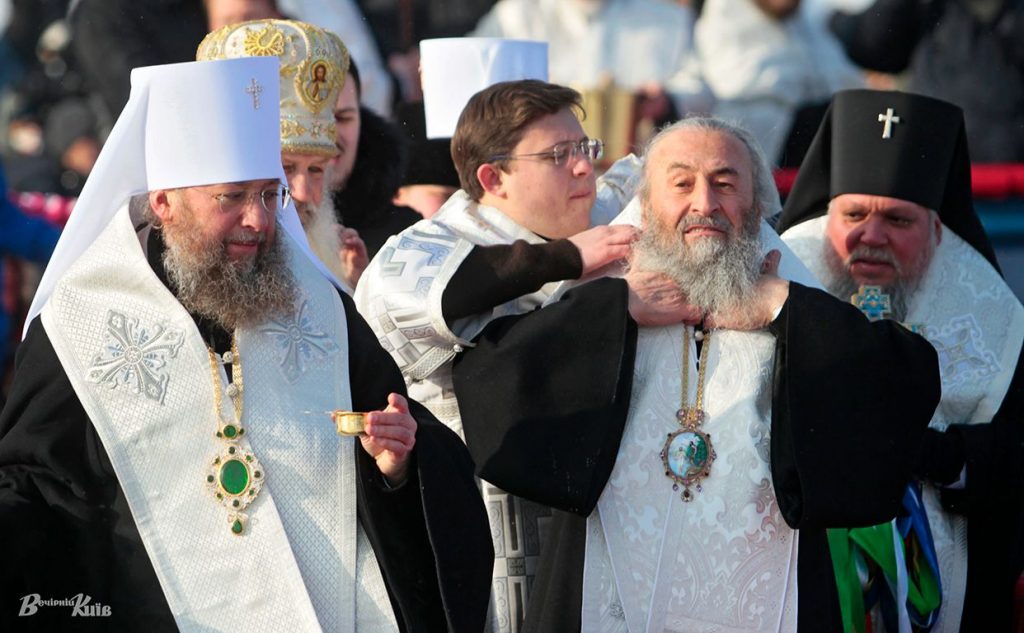
On Tuesday, July 25, the Russian Ministry of Foreign Affairs published a report entitled “On the illegal actions of the Kyiv regime against the Ukrainian Orthodox Church (UOC), its clergy and parishioners.” In this report, Russian diplomats tried to present their vision of some processes around the Ukrainian Orthodox Church. In particular, the authors of the report draw attention to the adoption of several laws that, in their opinion, discriminate against the activities of the UOC and also analyse the actions of the Ukrainian special services, local authorities and the reaction of international organisations.
Key theses:
- “For many years, the Kyiv authorities have been actively pursuing in Ukraine a policy of liquidating the canonical Ukrainian Orthodox Church (UOC), discriminating against its clergy, and persecuting clergy and believing citizens. For this purpose, the country’s legislative system is being built, and the actions of various law enforcement agencies are being guided.”
- “To liquidate the UOC, an appropriate legislative framework has been created and built up. Thus, on December 1, 2022, the National Security and Defense Council of Ukraine (NSDC) adopted a decision, the actual purpose of which is the total restriction of the rights of the UOC communities. The decision approved many measures, including the drafting by the Cabinet of Ministers of a bill to ban the UOC, increased pressure on her Ukrainian special services, depriving her of the right to use the temples of the most ancient and largest monastery – the Kyiv-Pechersk Lavra; the imposition of so-called “sanctions” against its bishops”.
- “In the largest Christian denominations in Ukraine, the belonging of believers (parishioners) to a religious community, due to their large number, as a rule, has not yet been legally fixed. The vague wording of the new Law allows local authorities to organise the seizure of the temples of the UOC.”
- “During the period from May to December 2022, the Security Service of Ukraine, in cooperation with other law enforcement agencies, under the pretext of “counterintelligence activities”, conducted massive unauthorised searches in the dioceses, monasteries and communities of the UOC throughout Ukraine.”
- “Despite the massive searches that covered all the dioceses of the UOC, the evidence presented to the public was reduced to theological, liturgical and historical literature in Russian or to false propaganda leaflets. In some cases, materials were planted in the presence of the victims.”
- “In addition to the numerous arrests of bishops and clerics of the UOC, there are facts of disappearances and abductions of the clergy, evidence of their torture and beatings, as well as death under extremely obscure, unclear circumstances.”
- “Local authorities come up with recommendations or demands for UOC communities to convert to other confessions. Appeals of self-government bodies (regional and city councils) to the leadership of Ukraine with calls to ban the UOC are widespread. In several settlements in Western Ukraine, local authorities forcibly close churches, prevent believers from attending services, and enact “bans on the activities” of the UOC in the field.”
- “According to the leadership of the UOC, in 2022, in Ivano-Frankivsk, Lviv, Volyn, Rivne, Zhytomyr, Khmelnytsky, Vinnytsia, Chernivtsi, Chernihiv, Kyiv and other regions of Ukraine, 129 churches were seized, and only in 31 cases there was a voluntary transfer of communities.”
- “Hate rhetoric against the UOC is being cultivated by major politicians, state leadership and officials at the regional level, and a massive information campaign is being waged against it in state and commercial media. This resulted in acts of vandalism and arson of churches and shrines of the canonical Orthodox Church, unmotivated violence and aggression against its clerics and believers.”
Outcomes and outlook:
With such reports, Russia only renders a disservice to the Ukrainian Orthodox Church, further adding fire to relations between Ukraine’s UOC and state structures. It is quite possible that Russia “for the sake of the picture” needs further incitement of the religious conflict in Ukraine, the feat of the Church and its hierarchs, the banning of the UOC and its retreat “into the catacombs”. But in this case, the question arises about such reports’ sincerity and efficiency.

